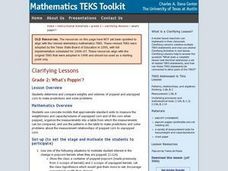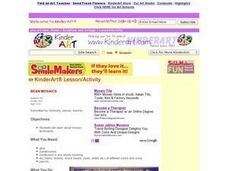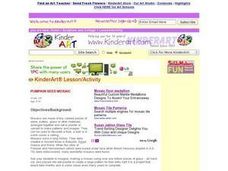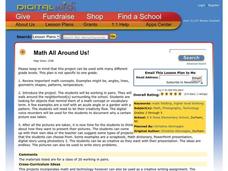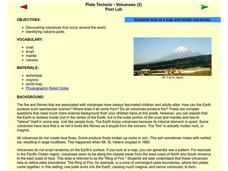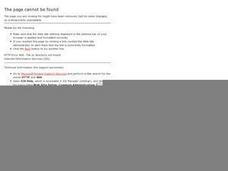Curated OER
Comparing and Contrasting
Students practice compare and contrast skills. In this science and language development lesson, students complete a T chart generating traits of a snail and a clam. Students complete a related worksheet.
Curated OER
Snowflake Printing
Students create snowflakes using white glue, plastic fruit baskets, glitter, and dark construction paper in this art lesson that teaches the concept of printmaking. Emphasis is placed upon understanding and applying media, techniques,...
Curated OER
What's Poppin'?
Second graders determine and compare weights and volumes of popped and unpopped corn to make predictions and solve problems. Students combine the data of each group into a graph. They construct questions, statements and story problems...
Curated OER
Eating and Being Healthy
Students investigate healthy lifestyles by examining the food pyramid and performing physical activities. In this personal health instructional activity, students discuss their own diets and how it compares to the food...
Curated OER
Pumpkin Seeds Mosaic
Students examine the history of mosaics. They follow instructions to create their own pumpkin seed mosaic. They also bake some of the seeds to enjoy as a treat.
Curated OER
Our Illuminated Alphabet TESTing
Learners practice writing letters of the alphabet and explore how decorated letters can be used to convey stories or symbolic ideas. They create an "illuminated" alphabet in which each letter conveys concepts of home and family.
Alabama Learning Exchange
Weather Detectives
Second graders make weather observations and record data. They use the internet to get data on the weather. After 5 days students predict the weather for the next 3 days.
Curated OER
Good Knight Alphabet Quest
Students will learn new words by using their favorite books. They will examine fiction and nonfiction works to differentiate types of literature. The lesson engages learners because it is using the format of a game to deliver instruction.
Curated OER
Our Illuminated Alphabet
Students write letters of the alphabet and explore how decorated letters can be used to convey stories or symbolic ideas. In this decorating alphabet lesson, students create an “illuminated” alphabet in which each letter conveys concepts...
Curated OER
Math All Around Us!
Students walk around their neighborhood and school to find objects that remind them of a math concept or vocabulary term. In this real world math lesson, students find math concepts in various familiar locations and take pictures of...
Curated OER
The Honey Bee Body - Paper Honey Bee
Students construct a paper honey bee to learn the six major parts of a bee and other insects. They compare their own body parts to those of bees. They utilize worksheets imbedded in this plan to help them design their bee.
Starfall
Ii is for Igloo
For this printing instructional activity, students form the upper and lowercase letter Ii. Students also color in pictures that begin with the letter Ii.
Curated OER
Sight Word Activity Pages
For this sight word worksheet, students are given a calendar naming 4 weeks worth of sight words and their activities for each school day of the week. Activities follow on subsequent pages.
Curated OER
What's the Texture?
Students sort, classify, and write about how they sort a variety of shells.
Curated OER
Plate Tectonic - Volcanoes Post Lab
Second graders discover volcanoes that occur around the world. They identifying volcano parts.
Curated OER
"What Insecit Am I"
Students play the game "What Insect Am I" to explore the parts of an insect and their habitats.
Curated OER
Playground Zoom
Students observe and draw small objects on the playground or in the classroom with and without a magnifying glass. They explore how lenses can affect the way that an object is observed from afar or remotely sensed. Afterwards, they share...
Curated OER
The Mixed Up Chameleon
Students read the story The Mixed Up Chameleon and complete discussions questions as they read the story. In this comprehension lesson plan, students also draw animals, list animals, and create a class book.
Curated OER
Geometry Gymnastics
Students identify shapes and manipulate 2 and 3 dimensional objects. They view objects from different perspectives and review relative positions (near, far, between). They sing a shape song.
Curated OER
Footprint Detectives: Making Inferences Using Dinosaur Trackways
Young scholars analyze and discuss footprints and dinosaur tracks. They listen to books about paleontologists, create and analyze their own trackways using black paper and chalk, examine the data, and form hypotheses about footprints and...
Curated OER
Complementary Color Portraits
Students create complimentary color portraits using crayons in this elementary school Art lesson about the use of complimentary colors. The lesson includes an example of complimentary art, recommended books, and a downloadable color wheel.
Curated OER
Bee Kind Hearts
Students promote random acts of kindness. For this character education lesson, students record acts of kindness that they witness on paper hearts. Students create a chain of hearts to hang in the school.
Curated OER
Calder's Balancing Acts
Students learn the vocabulary of contemporary sculpture and distinguish between abstract and realistic sculpture, mobile and stabile, biomorphic and geometric. They write equations using Calder's mobiles


